After losing nearly 300 and prevailing infection to more than 12,000 people, it is still too early to assess the real psychological costs of the pandemic at a place that is already plagued by mental morbidity. Doctors are working non-stop, off-line and online to reduce the tension load but the early signs suggest that despite Kashmir having a history of coping up with the mental morbidity, a bad turn in Covid-19 numbers can be a serious challenge, reports Saima Bhat
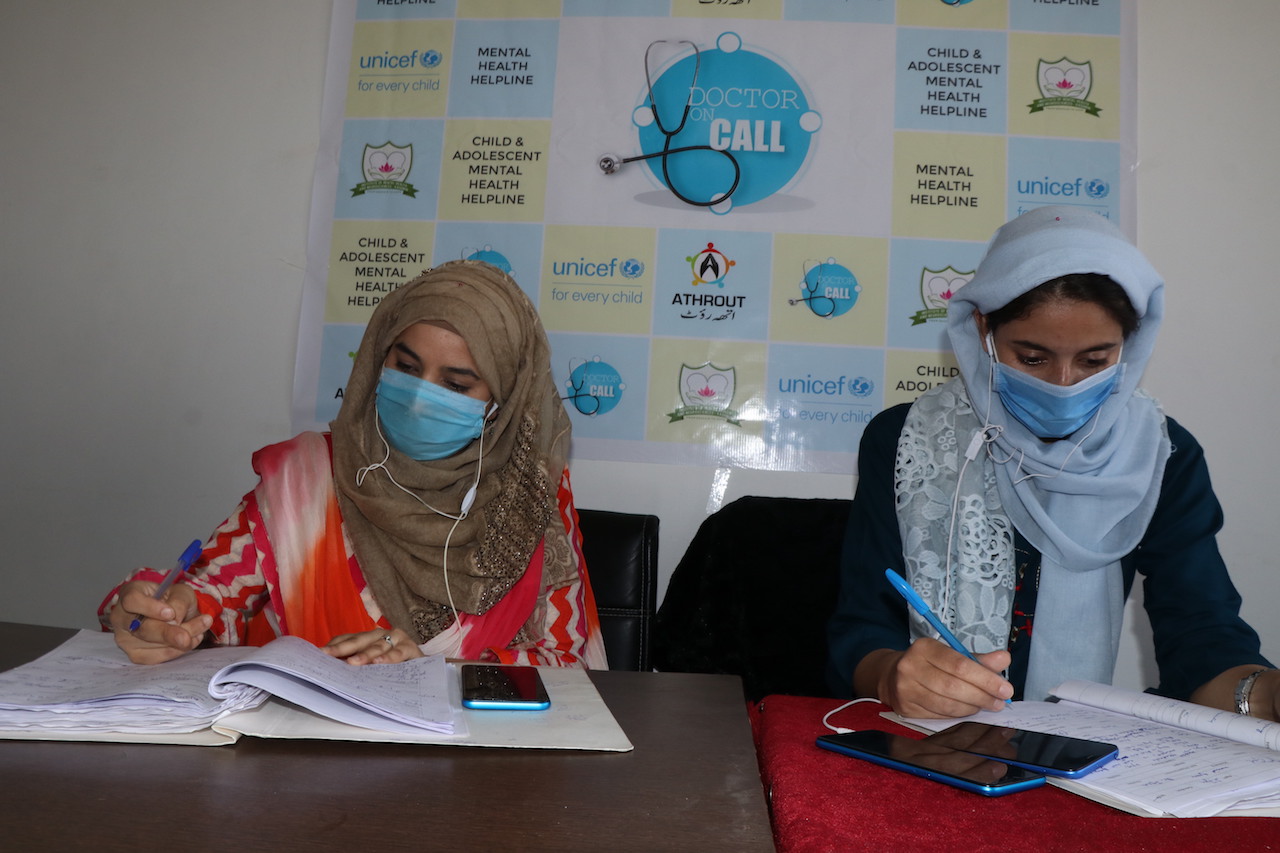
Medical professional busy counselling patients online from the office of the Athrout, one of the key NGOs working on social and medical fronts in Kashmir. KL Image: Bilal Bahadur
The day Kashmir declared its first Covid-19 case from Srinagar in mid-March, Shabir Ahmad, 45, confined himself to the four walls of his home. The provisional store owner in an uptown locality, he stuck to the ‘stay home, stay safe’ policy religiously. Ahmad’s priority was to ensure that he along with his family remained safe in the pandemic.
“It was not like any other disease for which we have a cure for. It is pandemic,” Ahmad said. “There is mention of pandemics in our holy book. Besides, our history is witness that such situations have always killed a large number of people”.
Occasionally, Ahmad would come out to get groceries. But a mask, a pair of gloves, sanitizer and an extra bag to carry the groceries home, were his inseparable companions. Once home, he used to deposit the contents in a separate room for three days before putting them to use. Then, he would head to the washroom, take a bath and wash all his clothes. He would also ensure that his family maintained proper hygiene even during their stay at home. This routine continued for almost three months.
However, when the government decided to slowly reopen the economy, Ahmad’s reaction changed. As the district administration rolled out the plan to ease restrictions, he also gave up precautions.
Ahmad reopened his shop. He cleaned the mess, dusted the area, and resumed operations. Interestingly, he did not use his mask as well.
“When I asked him why he stopped wearing a mask, his reply surprised me. He said gov ha yaile wain kya problem cha (the restrictions have been lifted what is the problem now),” said one of his neighbours Rafiq Ahmad.
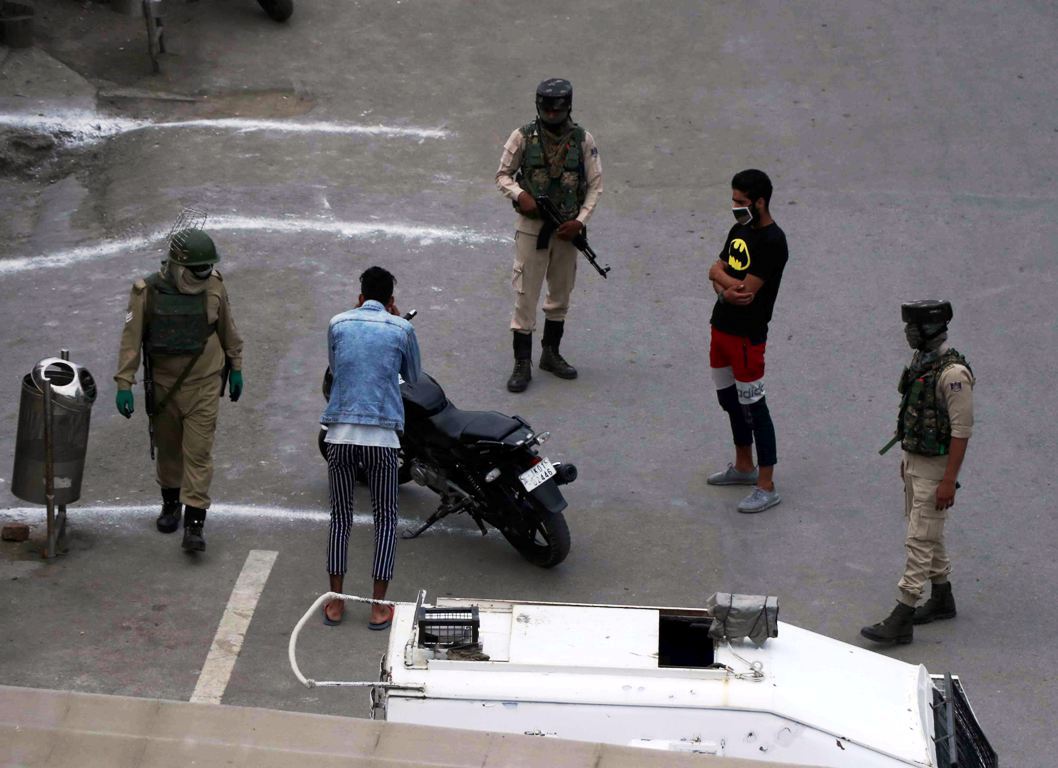
A youth holds his ears while doing sit-ups as a punishment for not wearing a mask during lockdown imposed to limit the spreading of coronavirus disease (COVID-19) in Srinagar on Friday, May 22, 2020. KL Image By Bilal Bahadur
Rafiq added he has not seen any other noticeable change since then in Ahmad. “It was just a behavioural issue, rest was all fine. Such type of anxiety was common in those days,” he said.
Rafiq, a tailor by profession, had his own issues. He suffers from depression and has been on medication for the past decade.
“I also locked my gate from inside and didn’t allow any outsider. Every morning when I used to go out for buying vegetables, I used to wash the knob of the main gate and the main door, besides other things that I came in contact with,” he said.
Rafiq said, his condition deteriorated following August 5, 2019 lockdown. He was unable to contact his doctor or go to the psychiatry department located at SMHS hospital, so he had to increase the dosage of his medicines and wait till he managed to visit the doctor.
Although he put up a strong face, the crisis simmering since August took its toll. “I did not want to die before my actual death but at the same time, the situation outside was not good. There were strict restrictions in place. My mind became the abode of all the negative thoughts,” he said. “We have been living under such circumstances from August 5 now. I have no savings. I earn and consume on a daily basis. How long can we sustain like this? Hope you understand what I mean.”
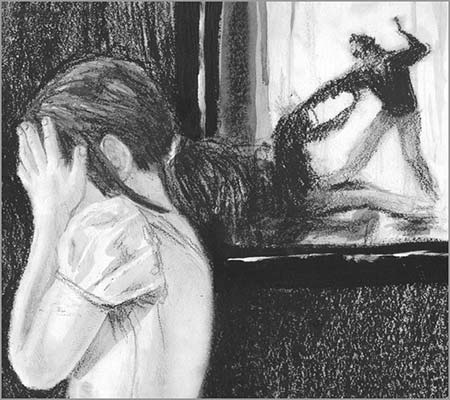
Representation picture: In the wake of Coronavirus, there have been increased cases of domestic violence in Kashmir.
Every morning Shazia wakes up with a panic attack. Her concern is the growing abuse at her in-law’s place. Being an orphan she could not afford to resist. A recent medical emergency wiped out all her savings.
A teacher by profession, the Covid-19 lockdown was the first time she stayed at home with all members present since her marriage. “My days started with panic and ended on regret,” she said. “My father-in-law and other members make me labour like a donkey and abuse my parents. My husband is a facilitator,” she said.
For the first couple of months, she said, she had no way to visit her only brother. But once the lockdown was relaxed in May, it became possible for her to do so. But her anxiety persisted. “She was always lost in thoughts,” said her sister-in-law.
The experts say that mental health issues have grown during the pandemic.
“A long lockdown can trigger mental health problems. It has become a routine in Kashmir. We had lockdown post-August 5 and now we have run into the virus lockdown,” said Dr Mohammad Maqbool Dar, head, and professor at the Institute of Mental Health and Neurosciences (IMHANS) which operates from the SHMS hospital and Rainawari hospitals.

Dr Mohammad Maqbool, HoD IMHANS Kashmir
“No doubt the present lockdown was important but it did affect the mental state of people. Kashmiris have come out better. They have better resilience out of their experience. However the mental problems have increased and in days to come we may get more patients with such issues,” he added.
Shaheena, a student of sociology, said that the new realities of life like working from home, lack of interaction, layoffs, home-schooling and the other lifestyle changes have been too much for people to handle.
Challenge for Frontliners
Despite the time gap since the outbreak, the experts warn that health-care workers on the frontlines face their own set of problems. A doctor working in peripheries, wishing anonymity, said: “We are in panic and our challenge is not to pass this stress to our patients,” he said. “Managing ailments with fear of getting one is in itself a challenge.”
A doctor at the SMHS had similar thoughts to share: “Stress kills, primarily by two things: first due to vaso-spasm in the vascular system and second due to immuno-depression, the suppression of the immune system.”
Impact on children
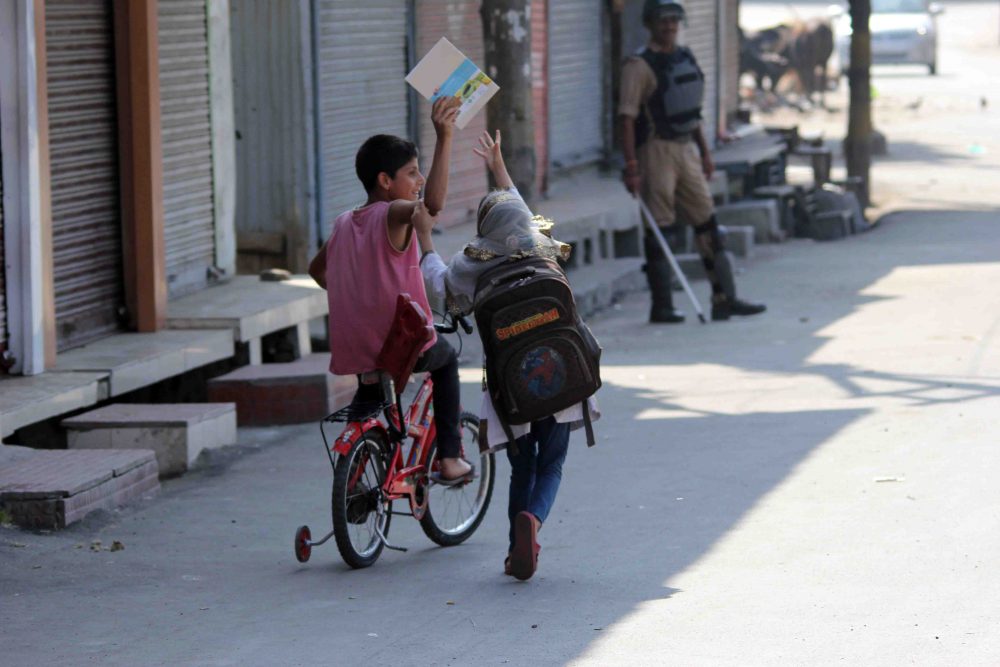
As the children are not able to go to their schools, experts have seen symptoms like anxiety, irritability, indifference and despondency increasing in school-going children. KL Images: Bilal Bahadur
The anxiety due to Coronavirus has been found in children as well. Falling in the vulnerable group, this young population has been seen with the symptoms of anxiety, irritability, indifference and despondency.
A class 5th student, Faiq, was getting violent on every mention of his books. An above-average student he loved his books. As the Covid-19 locked everything, education too took a backseat.
Faiq felt bored at home. Closure of classes disturbed his routine. “Whenever I asked him to study he would get angry and aggressive. Initially, I thought his father is not able to handle him so I started resorting to punitive measures. But that did not solve any problem and instead, he was getting more aggressive and depressed,” said Maryam, his mother.
But once she shared her problem with sister, she gave her a helpline number and asked her to consult the doctor on phone. “I did and it shocked me when the doctor said he was not doing it deliberately. I started feeling ashamed.” Maryam said adding she now regularly calls the doctor for consultation.
Dr Zaid Ahmad Wani, a professor at IMHANS, said children are the most vulnerable to crisis-like situations like Covid-19. “Children don’t possess abstract thinking capabilities like adults. They can’t see the greater good in a situation completely. Children are more impulsive than adults so delaying the gratifying situation and tolerating uncertainty is tough for them. Children also don’t possess sufficient coping resources as adults do,” Dr Wani said adding children can’t endure isolation for long periods of time.
“We saw the impact of social distancing on children was significant as children are more active than adults. They like to go out and play, while adults anyway are used to working indoors mostly,” said Dr Zaid.
Talking about the families caught in domestic violence or financial crunch, the doctor said children become the victims of adult frustrations and domestic violence.
This was for the first time, the schools started online classes, commonly known among children as Zoom classes. Dr Arshad Hussain, a professor at IMHANS, terms the advent of online education a positive development. “This is a digital generation. Anything related to phones excites our children so when they have to attend their classes on phone, I believe they are happy that they have internet-working.”
Sharing the personal experience of his two kids, Dr Hussain said the online education kept them busy for half the day. He, however, suggested that children should be kept away from too much information on Covid-19. But at the same time, he is apprehensive about how the no schooling, no classroom will affect and shape the new generation.
Post Pandemic
If the doctors are to be believed, mental health is likely to emerge as a challenge after the pandemic is over.
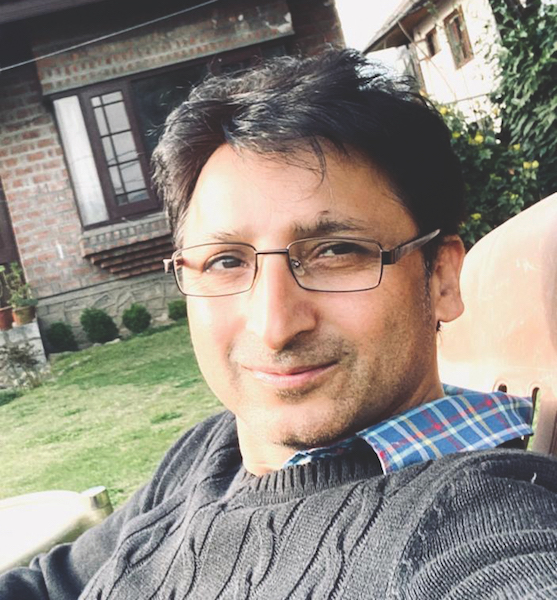
Dr Arshid Hussain, Professor, IMHANS Kashmir
Dr Hussain and his team have a suggestion for the administration: “If they could control the mortality and morbidity in Kashmir then the impact of Covid will be meagre but if God forbid, the mortality increases only then the impact will be huge.”
Urging people to take precautions, Dr Hussain said that the restrictions have been eased because of the economic reasons not that Covid has ended. “Pandemic has just begun and if there is a vaccine it will be good news for all of us. But presently we should be prepared for at least a wait of one year,” Dr Hussain said. “We have to take safety measures, I don’t think 500 people need to come to OPDs, this is not acceptable.”
He also called for behavioural change among people saying if they are getting services free of cost and home delivery of products, people should avail such facilities.
As for Covid-19 induced depression, Dr Hussain said, there was a decrease in distress calls. “Initially anxiety was up but now we see it decreasing. With time people adjusted themselves with new norms of physical distancing.”
Decades of turmoil in Kashmir, Dr Hussain said, has brought in a certain amount of adaptation that has passed on from generation to generation. “Twenty years ago, if a bullet was fired kilometres away people would shut down markets. But today you won’t see such a reaction. People are still afraid, but they have now learned to keep the cycle of daily life going.”
An Alternative
The main challenge for the IMHANS was to provide an alternative mechanism for the patients who had to come for their follow-ups. But coming to hospitals or clinics physically was not possible and not advised as well. The administration took a call and decided to use on-line consultations. Currently, at least three helplines have been set up in district Srinagar alone.
However, the clinics were not closed. In case of a requirement, the patients were examined properly. As per the statistics of the IMHANS, the department in the last three months provided consultation to at least 11012 patients from its OPD which has been completely shifted from SMHS hospital to Rainawari hospital and around 8000 consultations were provided online.
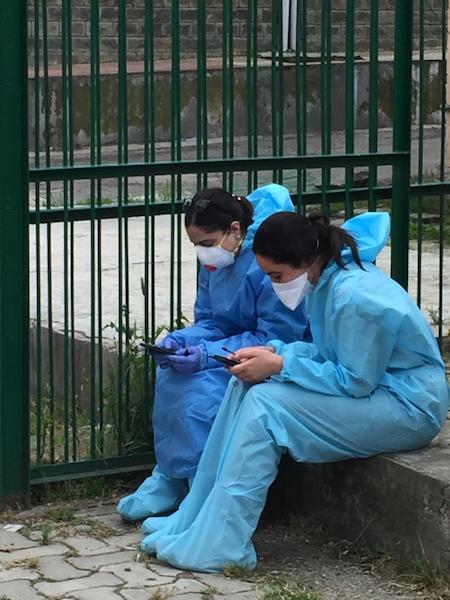
After finishing their consultations in the OPD, these doctors were seen giving consultations online without getting the time to change their PPEs. KL Image: special arrangement
Across the globe, online consultations are paid services but in Kashmir, this service is provided free of cost.
Experts said the legality of the online system was ‘debatable and doubtful’, but modifications helped in the crisis. “In places like India you cannot offer teleconsultation but as the Covid-19 progressed, certain modifications were made that made it possible to prescribe medicines over phones. In the second modification, prescribing benzodiazepine was also allowed,” said Dr Hussain.
Of all the online medical telepsychiatry turned out to be the most successful.
“In our line of treatment, we have to mostly talk to our patients. So talking on the phone was not a problem but initially, it took us time to get adjusted to the new system,” Dr Hussain said.
The online system of treatment, Dr Hussain said, has largely benefitted the upper strata of society as poor lack the know-how and also, the smart cellphones to avail it. “The benefit of online consultation was mostly taken by the people from the upper and elite class who had other ways of getting consultations as well,” he said.
But there are initiatives at the local level coupled with administrative support as well. The DocOnCall helpline started by IMHANS in collaboration with a local NGO Athrout mostly works for the poor people in the old city of Srinagar. Led by Dr Hussain and Dr Yasir Rather, a team of registrars have received at least 1200 calls in the last three months. In a slot of five hours a day from 10 am to 1 pm and then from 4 pm to 6 pm, the team receives around 50 calls a day. Out of these, almost 40 calls are about the follow-up cases and 10 constitute new ones. Besides, the doctors also see many patients waiting in the hospital OPDs.
“It breaks our heart that these patients come from such a long distance for consultations when they could have availed it at their fingertips. In addition, they wait for hours for their turns.” Dr Hussain said, “Out of 500 patients in OPD, only 10 per cent are the emergency patients who need to come to the hospital. 90 per cent of these patients come without wearing a mask.”
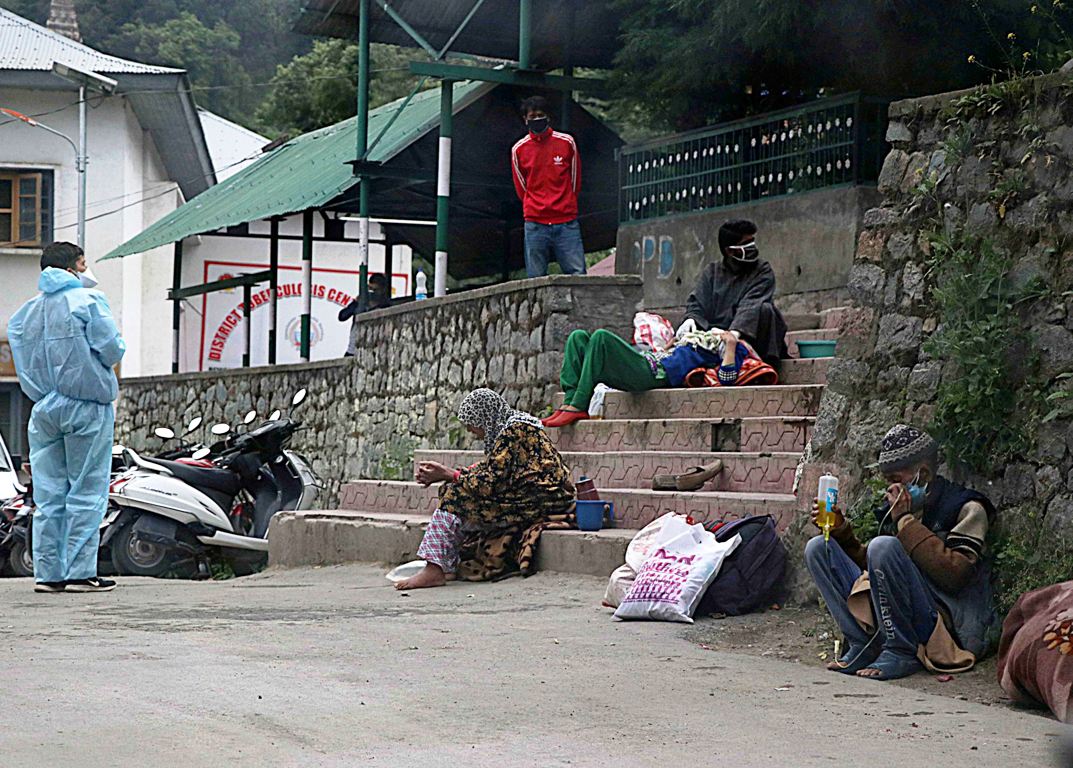
Helplessness. As patients were confirmed positive on Monday, May 18, 2020, the SMHS ambulance ferrying them to the CD Hospital dropped them on the roadside in Dalgate. It was after some time that the CD hospital staffers helped them get into the Covid-19 Special Hospital. KL Image by Bilal Bahadur
Doctors further said that the patients visiting the OPDs mostly show symptoms of anxiety including palpitations and breathlessness. People also are seen to have episodes of mood swings and irritability; many come with generalised anxiety disorder symptoms.
As the new system of treatment was started, it had its demerits as well. Doctors were apprehensive of the misuse of medicines even if 99 per cent of the prescribed drugs are not narcotics.
Other than DocOnCall helpline, two more helplines are operative; one through the Divisional Commissioner’s office and another through District Commissioner’s office where patients are provided consultations on phone and WhatsApp Video calls. Besides these services, many doctors associated with the department are also volunteering without any consultation fees.
At the Divisional Commissioner’s helpline, the cell is run by a team of doctors led by Dr Maqbool. The team has also clocked highest online consultations at 109 calls in a week while others received on an average 30 calls), who looks after the children’s exclusive help desk under child psychology.

Police personnel stand guard at a roadblock during restrictions imposed as a preventive measure to keep the Coronavirus at bay. The garble in the photograph indicates the tension in Kashmir mind. KL Image: Bilal Bahadur
Going forward, experts suggest taking care of mental health has to be a part of the anti-Covid program. During a joint session of the South Asian Association for Regional Cooperation (SAARC) nations, held on a webinar to discuss psychiatric issues arising out of Covid pandemic, the chairperson of Jammu and Kashmir ’s Disaster Management Task Force of Indian Psychiatric Society Dr Abdul Majid said: “Mental health has always been a subject that we have underinvested in. Right now in this crisis we more than ever need to stress upon mental well being and awareness as part of our overall anti-Covid program.”
Dr Majid warned that “we have to do it on a war footing if we don’t want a large section of the populace becoming afflicted with serious mental issues due to continuous stress and anxiety triggered by this unprecedented lockdown and subsequent economic and social issues.”
from Kashmir Life https://ift.tt/2WPmCaT
via IFTTThttps://kashmirlife.net
No comments:
Post a Comment